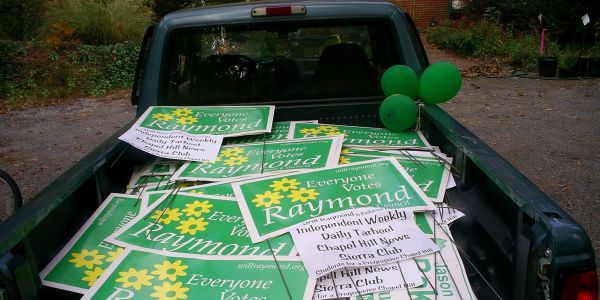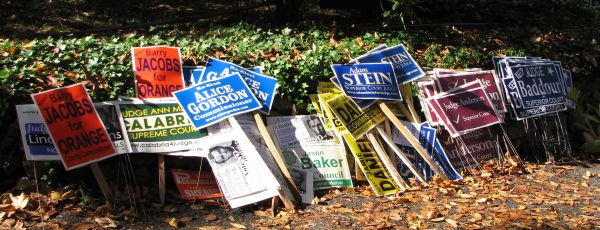I’ll be wrapping my election coverage up in a series of posts, including a big thank you for all of you that “had my back”, but, before that, I just read these two items from today’s newspapers that underline why the incumbents strategy of disengagement was so corrosive – and was quite a shameful disservice to our community.
Only two days ago, incumbent candidates for Chapel Hill Town Council claimed Tuesday’s election had no issues, that it was really about the larger matter of how the town’s growth would be guided in future years.
Three of the four incumbents were re-elected Tuesday on that platform. And Wednesday night they took a step toward molding that growth, agreeing with Mayor Kevin Foy’s proposal to clarify principles established by the 2000 Comprehensive Plan.
Foy referred to informal talks with developers interested in projects on U.S. 15-501 across from Southern Village, near Glen Lennox and other areas. “I want us to confront the growth pressures in a way that gives our staff more specificity,” Foy said.
Other council members agreed with his assertion that the Comprehensive Plan now seems too vague.
“We need to be clearer and more precise in our language because it affects what we put on the ground,” said Councilman Jim Ward.
The Comprehensive Plan was adopted on May 8, 2000, and was intended to articulate “a vision and directions in which we want the community to move,” according to the town Web site. “It suggests the ways in which we can invest in our community and build value for the 21st century. And, most importantly, the plan focuses on specific actions that will help us achieve the future we desire.”
Foy was a member of the Town Council that worked on that project. Seven years later he doesn’t think the plan is specific enough. In a memo to the council, Foy explained that a strategic reexamination of the plan could help guide land development.
“For example,” he wrote, “the plan set forth certain criteria for the northwest quadrant of town, but when pressures built we discovered that the council, the neighbors, and land developers had different viewpoints about what the plan called for.”
Councilman Bill Thorpe pointed out the pink elephant in the room, wondering aloud why Foy waited until the day after an election to broach the topic of development pressures in Chapel Hill. He described the mayor as “smooth” and told Foy that the council is not afraid to take on a project like this.
“It’s a new day,” Thorpe said. “Let’s move forward.”
Nov. 8th, Herald-Sun
Smooth? I’d say slick political gamesmanship.
I not only called for a refresh in our comprehensive plan prior to the election but also lobbied for a new process of keeping our plan flexible and adaptable. Sure, the incumbents co-opting my call for adding clarity, specificity and predictability to our Town’s growth plan, at some level, is gratifying but, admittedly, discouraging in that I believe they will give the process the same old superficial shellacking we’ve seen with other policies.
Bill Thorpe says “it’s a new day” but I don’t think so – it is more of the same kind of clever surface manipulation of issues – all sound, little fury – that’s digging our Town deeper and deeper into trouble.
Of course, I guess the ends, for some, always justify the means. If that means running as a block, eschewing an opportunity to engage and educate our community on, say, the comprehensive plan or the coming resource crunch, well, that’s alright by these politicians.
Poor policy, slick politics.
During the election it was obvious that the incumbents wanted to avoid substantive debate on the issues for a number of reasons. On the comprehensive plan, for instance, the fact that I’d led the way on calling for a review would underscore how proactive my stance on development has been.
Oh no, couldn’t acknowledge that a challenger had a good idea – that was an anathema to the incumbents’ “no mistakes” strategy.
For a (former?) activist like myself, someone that works hard to educate and engage our wider community in a variety of issues, I know we could’ve leverage the election to bring focus and attention to our critical growth problems – to explore different approaches, debate various strategies. To see that opportunity squashed so effectively by a political strategy was quite disappointing – and reflects poorly on that strategy’s participants.
The other article from today? Cam Hill’s call to ban watering lawns.
Fellow challenger Penny Rich and I talked about the limits of growth in terms of our ability to provide adequate water. The incumbents were not willing to admit their vision of high density development was at odds with our ability to sustain such development in light of our areas “carrying capacity’.
One of the incumbents was quite flip and dismissive about Penny and I’s suggestion that adequate water supply was one of the largest limiting factors in his plan for “rah rah” growth at any cost. Again, slick political strategy smothered civic duty.
Hill initiated the discussion in the wake of a presentation by OWASA staff showing that southern Orange County will be “vulnerable to severe drought conditions beginning in the early 2020s” if customers do not reduce demand and the agency doesn’t find new sources of water.
Now Cam and the re-elected incumbents can safely talk about our coming water crunch – no concerns about community alarm possibly influencing their quest for another 4 years in office. Again, if you’re desperate for a seat, great strategy for winning but a shameful disservice to our community.
Sad. Sad. Sad.
Which leads me back to my role in local affairs.
For more than six years, I’ve been dragging my old soapbox around, stepping up and passionately fighting for causes I believe in. Many times, whether on developing an economic plan for commercial development, setting targets for fuel use and tree restoration, working to save hands-on arts for Chapel Hill, saying we can only import so much water – export so much trash, I’ve been calling for action years ahead of the need.
I’m a proactive kind of guy. One foot in the future – looking for opportunities to improve our community – working to make sure our Town is ready to seize those opportunities. I’ve been effective at times – more than the incumbents were willing to admit – but at a fairly steep price.
Proactive and pragmatic doesn’t seem to be a priority for most local folks. Crisis seems, anymore at least, to be the only motivator.
Under those terms, I’m left with a personal dilemma: do I continue as before – getting some progress but with great effort – or do I just wait until the Town is in crisis and try to pitch in and help?
Or do I follow the recent ‘block’ of incumbents and disengage from any substantive, but politically risky, discussion at all?





